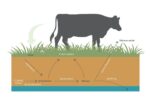Dairy farmers welcome the Government’s decision of no Capital Gains Tax
DairyNZ welcomes the Government’s announcement today that it will not be introducing a Capital Gains Tax. “Farmers are relieved by this. They work extremely hard alongside other New Zealanders to build a strong future for their families, while contributing to the economy and communities.” DairyNZ chief executive Tim Mackle says. There would have been wide-ranging ramifications for farmers if a Capital Gains Tax had been introduced. There have been strong concerns for the sector since the Tax Working Group’s report came out in February, as it described a system that looked likely to have significant implications for farmers across a broad range of areas from business asset valuations, administrative costs, succession planning and retirement schemes. DairyNZ is also very pleased with the announcement that there will be no water or fertiliser tax. “Farmers are already working throughout the country on continuously improving environmental sustainability on farms. Initiatives include more than 27,000 kilometres of fenced-off and measured waterways, putting in bridges or culverts at regular stock crossing points, and introducing farm environment plans – among just a few of the activities. “This investment in environmental work contributes considerably more to improving water quality and mitigating emissions than an environment tax would. Incentivising behaviour change has more positive impact than penalising farmers,” Dr Mackle says. “We are focused on ensuring the dairy sector achieves a balance between being competitive and profitable, while also meeting the expectations of our customers and communities and our desire to do the right thing.” DairyNZ said at the time that the Tax Working Group’s report came out that any changes to the tax system should better support the productive sector. “We are very pleased to have been listened to with the announcement today,” Dr Mackle says.










